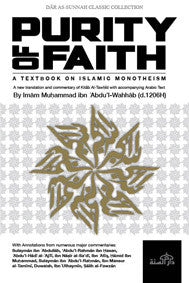
Purity of Faith by Imām Muḥammad ibn 'Abdu’l-Wahhāb (d.1206H)
A text book on Islamic monotheism
A new translation and commentary of Kitāb Al-Tawḥīd with accompanying Arabic Text
By Imām Muḥammad ibn 'Abdu’l-Wahhāb (d.1206H)
The order to live one’s life in accordance to the dictates of Tawḥīd, monotheism,
is the single most important injunction laid down by the revealed law, it
formed the core of the call of all Prophets and was the essential message
of all revealed scripture. To worship Allāh based on Tawḥīd is the purpose
of human existence, and it is through this worship that man achieves a
sense of fulfilment and contentment; in the words of one of the scholars, ‘he
enters a paradise in this world before entering the Paradise of the next.’
This book, apportioned in sixty-seven chapters, deals with many aspects of Tawḥīd,
all of them essential learning for every Muslim. Its focal topic revolves around
issues of ulūhiyyah, divinity and ibādah, worship, with some chapters dealing
with al-Asmā wa’ l-Ṣifāt, the Names and Attributes of Allāh. Its simple language,
well-ordered structure, and heavy reliance on Qur’ānic verses and ḥadīth of the
Prophet lends it to easy reading and its importance cannot be underestimated.
This work also includes the authors, ‘Letters on Tawḥīd’ and ‘Essay on the
meaning of the Kalimah’ and an additional appendix with 420 quick-fire revision
questions – which will contribute to an increased understanding , making it an
ideal text book for students of knowledge on the important subject of Tawḥīd.
The author, Muḥammad ibn `Abdu’l-Wahhāb ibn Sulaymān al-Tamīmī was born
in the year 1115H/1703AD in `Uyaynah approximately seventy kilometres north
of Riyāḍ and died in the year 1206H/1792AD at Dar`iyyah. He studied under
numerous scholars in `Uyaynah, Mecca, Madina, Baṣra and Huraymlā and was
highly proficient in Ḥanbalī jurisprudence, Arabic language and Qur’ānic exegesis.
He was devout, highly intelligent and had an excellent memory. His call was to
the revival of Tawḥīd away from the innovations and superstitions that had crept
into the belief of many Muslims and this da`wah spread throughout the world.
With Annotations from numerous major commentaries:
Sulaymān ibn Abdullāh, ‘Abdu’l-Rahmān ibn Ḥasan,
'Abdu’l-Hādī al-'Ajīlī, ibn Nāṣīr al-Sa’dī, Ibn 'Atīq, Ḥāmid
Ibn Muḥammad, Sulaymān ibn 'Abdu’l-Raḥmān, Ibn Mansur
al-Tamīmī, Duwaish, Ibn 'Uthaymīn, Ṣālih al-Fawzān
P/B - 480 pages
